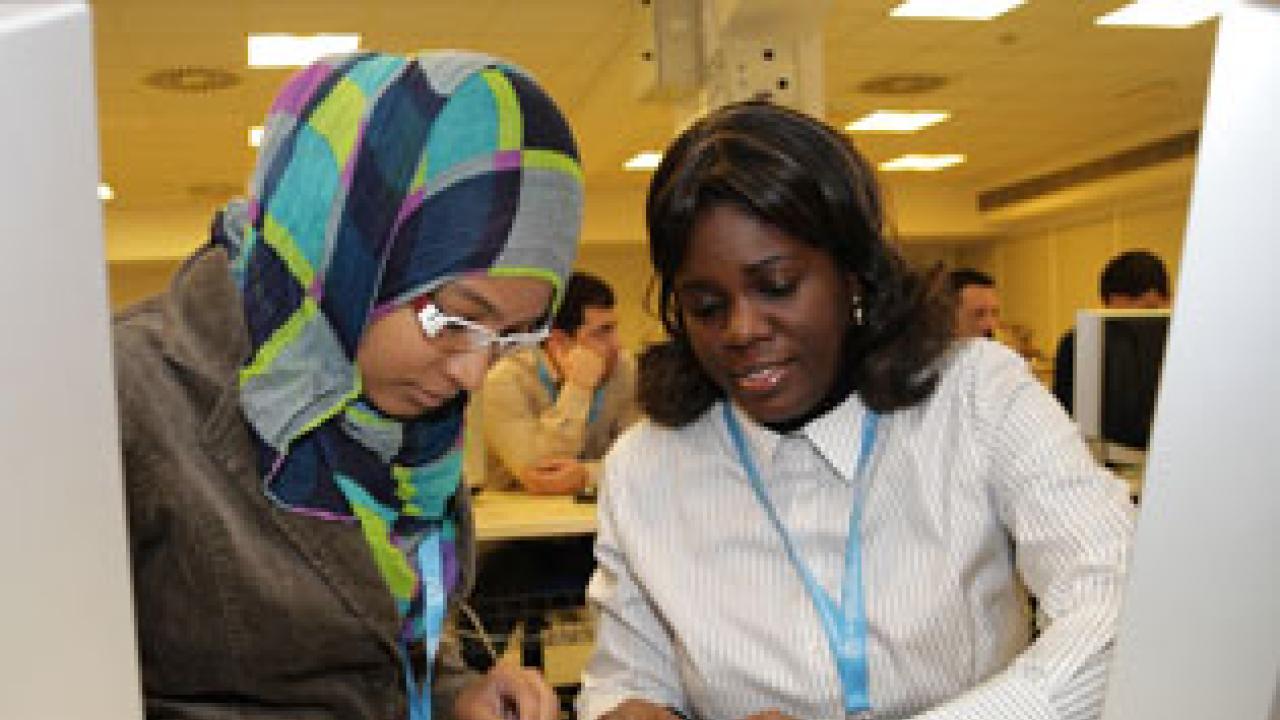
An isolated village in South Africa is looking to the sun to
help power its homes, and ICTP workshop participant Agboola Teru
will help it make the solar connection, thanks to skills he has
acquired through the Second Workshop on Open Source and the
Internet for Building Global Scientific Communities, held 28
November to 16 December in Trieste.
Teru, an ICT administrator at the University of Fort Hare's
Institute of Technology, is a returning customer, having attended
the first workshop in 2009, and says that at the time he found the
event "an eye opener." "I had been working with Linux for a long
time and was attracted to the workshop's focus on open source," he
said. Teru gained important knowledge from the workshop, and its
broad array of topics left him wanting more. When the announcement
for the 2011 workshop came out, he was determined to attend again,
this time as a self-funded participant.
He explained that his institute's effort to assist in providing
solar power to homes is the main driver behind his interest in the
workshop. "We want to create our own control panels, rather than
ordering them from Germany or China, which could take 6 months or
longer to deliver to South Africa. With the knowledge I gain from
this workshop about open source technologies, I can train my
students to build their own panels, giving them valuable hands-on
experience," he said.
Teru is one of thousands of scientists from the developing world
who have benefited from ICTP's series of workshops devoted to
no-cost or low-cost microprocessor applications in physics. Now in
its 30th incarnation, the series' key focus on "open source"
remains the one constant theme running throughout its history in a
field that is rapidly changing, according to Abhaya Induruwa, a
director of this year's workshop who has been involved in the
series since 1985 and has directed many Trieste and regional
workshops.
This year's workshop is organised and run by a group comprising
academics, researchers and entrepreneurs from developed (Germany,
Slovenia, Switzerland) as well as developing countries (Chile,
Malaysia, Nigeria, Sri Lanka, Ukraine).
"Our goal has always been to create a community of experimental
scientists in developing countries. By using open-source
technologies, our training can be easily adaptable to a wide range
of applications anywhere in the world," Induruwa explained.
From exposing physicists to the power of microprocessors in
1981--when personal computing was in its infancy--to offering
instruction on mobile and wireless networks, the workshop's ability
to evolve with the times makes it invaluable to scientists who are
looking for affordable, easy-to adapt ways to harness technology
for science. "Technology and the needs of physicists change. The
technology lifecycle is shortening. In the past we would have
devoted 3 or 4 workshops to a single topic; now it is hard to
predict what the technology focus of our next workshop will be just
a year from now," said Induruwa, adding, "But the one thing that
has remained over these 30 years is that we always teach the
state-of-the-art."
One possible future focus is the use of mobile technology in
collecting and disseminating data, according to workshop
co-director Carlos Kavka. "Mobile devices, tablets: these are
technologies we need to consider for science. As their prices
decrease, they will become more and more accessible to developing
country users. Right now we can buy open source devices made
in China for under $30," he said. Kavka, head of research and
development at technology company ESTECO (a co-sponsor of the
workshop), also sees cloud computing and wireless technologies as
areas to explore in future workshops.
As in the past, this year's workshop offers a wide array of topics
for participants, with lectures on everything from open source
operating systems and software to low-cost hardware
configurations. "The workshop's exercises are structured to
expose participants to as much material as possible, using open
source hardware and software," said Induruwa. He explained that the
workshop covers all aspects of building a scientific community,
starting with data acquisition using low-cost hardware; data
storage in open-source databases; data analysis; and dissemination
over the Internet using Web Services, a technology that allows
computer-to-computer communication without any human intervention.
He added that with present day, low-cost technology coupled with
miniaturisation, scientists can build networks comprising thousands
of sensors that could be deployed, for example, to study the
exposure of children in a locality to harmful environmental
elements.
The workshop sets aside time for attendees to present their past
work relevant to the workshop to the other participants, providing
an opportunity for them to see first hand some real-life
applications. These presentations have ranged from "Data
acquisition, Transfer and Processing in Seismic Network of Georgia"
to "Development of a wireless sensor network to monitor debris
flow".
"The workshop has provided me with a tremendous opportunity to
learn about the latest developments in open source technology,"
said Kirankumar Trivedi, a participant from India who is an
associate professor at Shantilal Shah Engineering College. "I have
enjoyed the cooperative learning style encouraged by the workshop,
as well as the active interaction with the faculty and the
participants from around the world," he said.
Trivedi shared his work on "'Internet of Things' for Sensors Data
Monitoring with Integration of Social Networks" during one of the
participant sessions, suggesting what could perhaps be yet another
topic for future workshops: the use of social media for science
dissemination.
But for now, participants like Trivedi and Teru can return to
their home institutes confident that the knowledge they have gained
from their three weeks at ICTP will help them keep apace with
today's rapidly changing technology.
For more details about the workshop, visit its website.
















